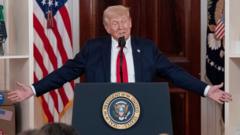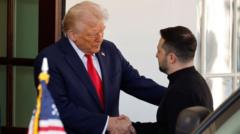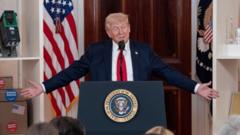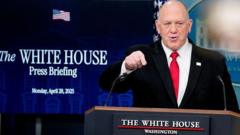As President Trump enters the second hundred days of his presidency, his foreign policy marks a sharp departure from traditional diplomacy, characterized by a transactional and exploitative approach that leaves allies and adversaries alike grappling with an ever-changing global landscape.
Trump's Chaotic Diplomacy: A New Era of American Isolation

Trump's Chaotic Diplomacy: A New Era of American Isolation
In his second term, Trump's foreign policy is marked by unpredictability and aggressive demands, shifting international relations.
It was a frigid February night in Munich, and an aide to Vice President JD Vance was persistently waking a senior Ukrainian official from his sleep. The mission? Secure agreement on a deal allowing the U.S. to extract precious minerals from Ukraine, a prominent agenda item set forth by President Trump. Despite the official's protests about the hour, the aide insisted the meeting must happen before Vance’s next day encounter with President Volodymyr Zelensky at a trans-Atlantic security conference. The proposal remained unsigned after their meeting, reflecting the tumultuous nature of American diplomacy under Trump's leadership.
This incident typifies the broader theme of Mr. Trump's first 100 days: a governance style that appears almost imperial and increasingly exploitative. Transactions, rather than established partnerships, have become the inherent structure of Trump's foreign dealings, marked by aggressive demands and a lack of consideration for longstanding alliances.
From the dismantling of NATO’s collaborative spirit to imposing staggering tariffs that prompted retaliatory measures from global trade partners, Trump has indeed swung a wrecking ball through traditional international relations. Observers note that, as a consequence, many allies feel unmoored, while adversaries adapt to the unpredictability that has come to define this new era of American isolationism.
Military engagements within NATO, such as the recent Arctic training exercises by U.S. marines in Norway, loom large as European officials express legitimate concerns over potential troop withdrawals from the continent. These strategic pivots reflect a comprehensive shift in American foreign policy that is reshaping global dynamics in ways not seen since World War II, leaving uncertainty in their wake.






















